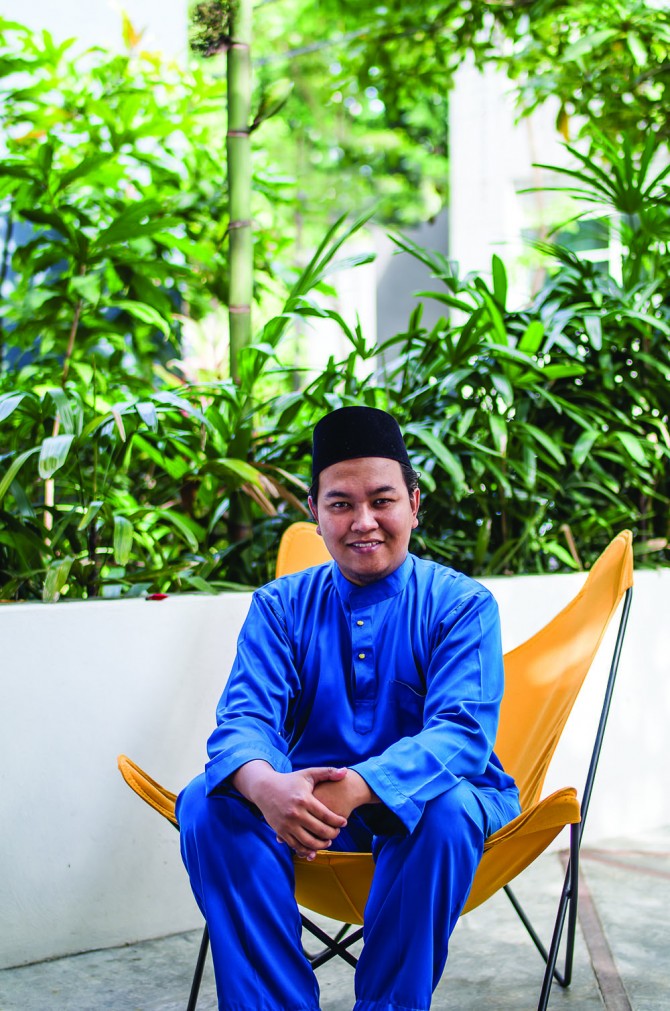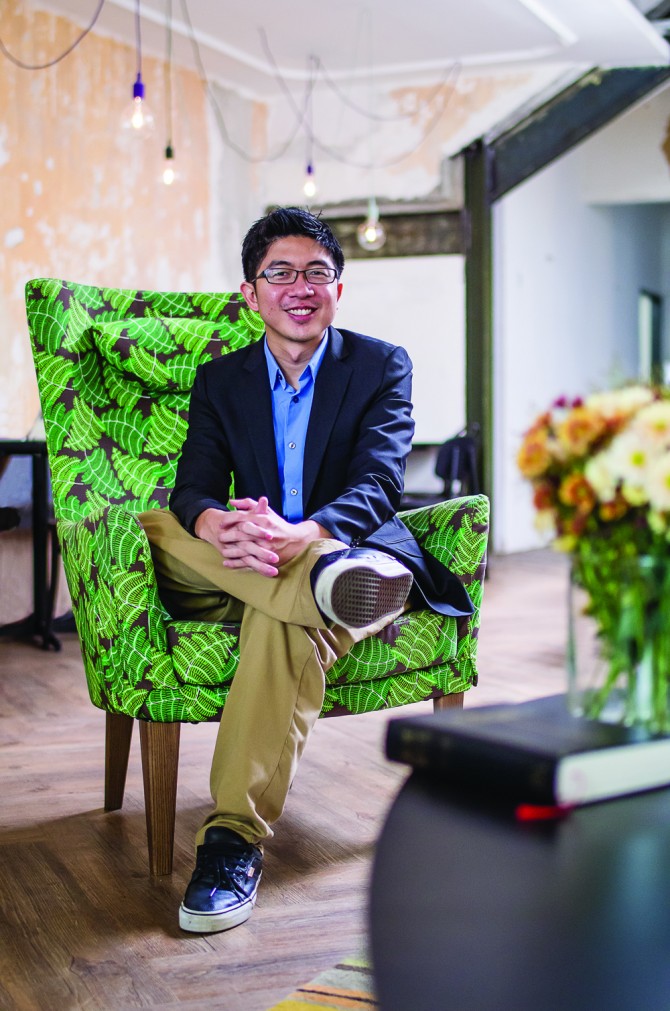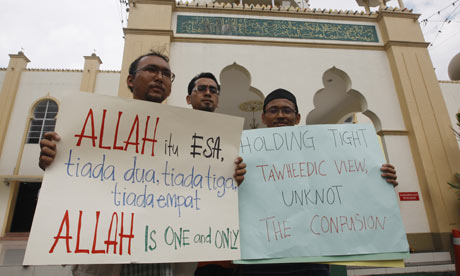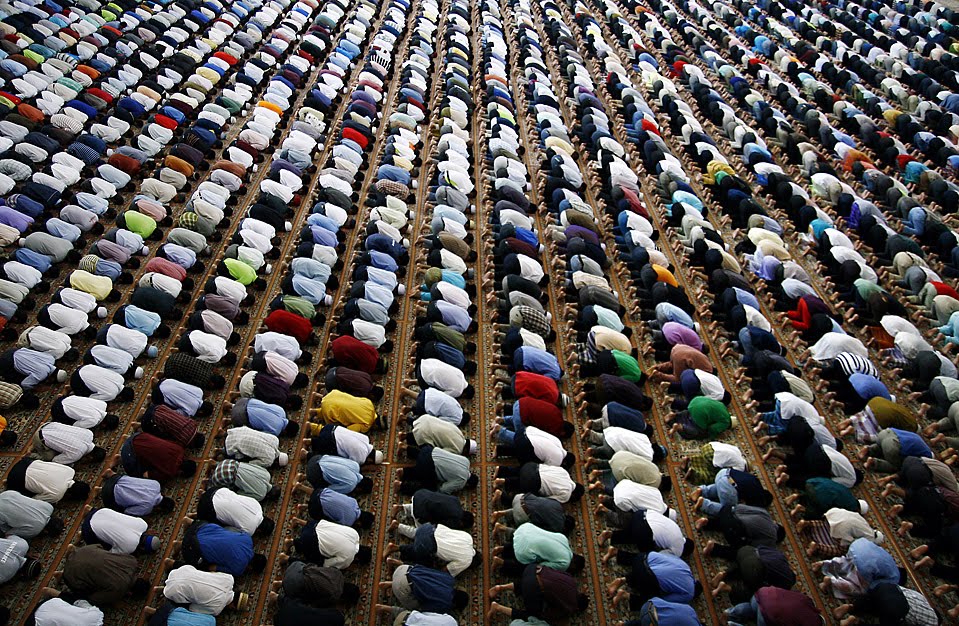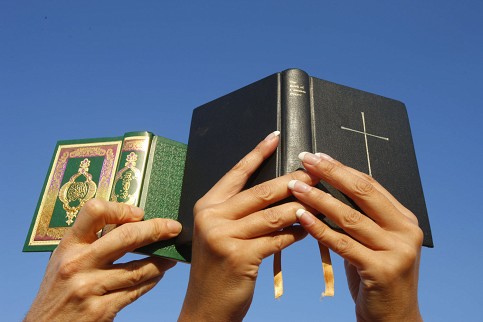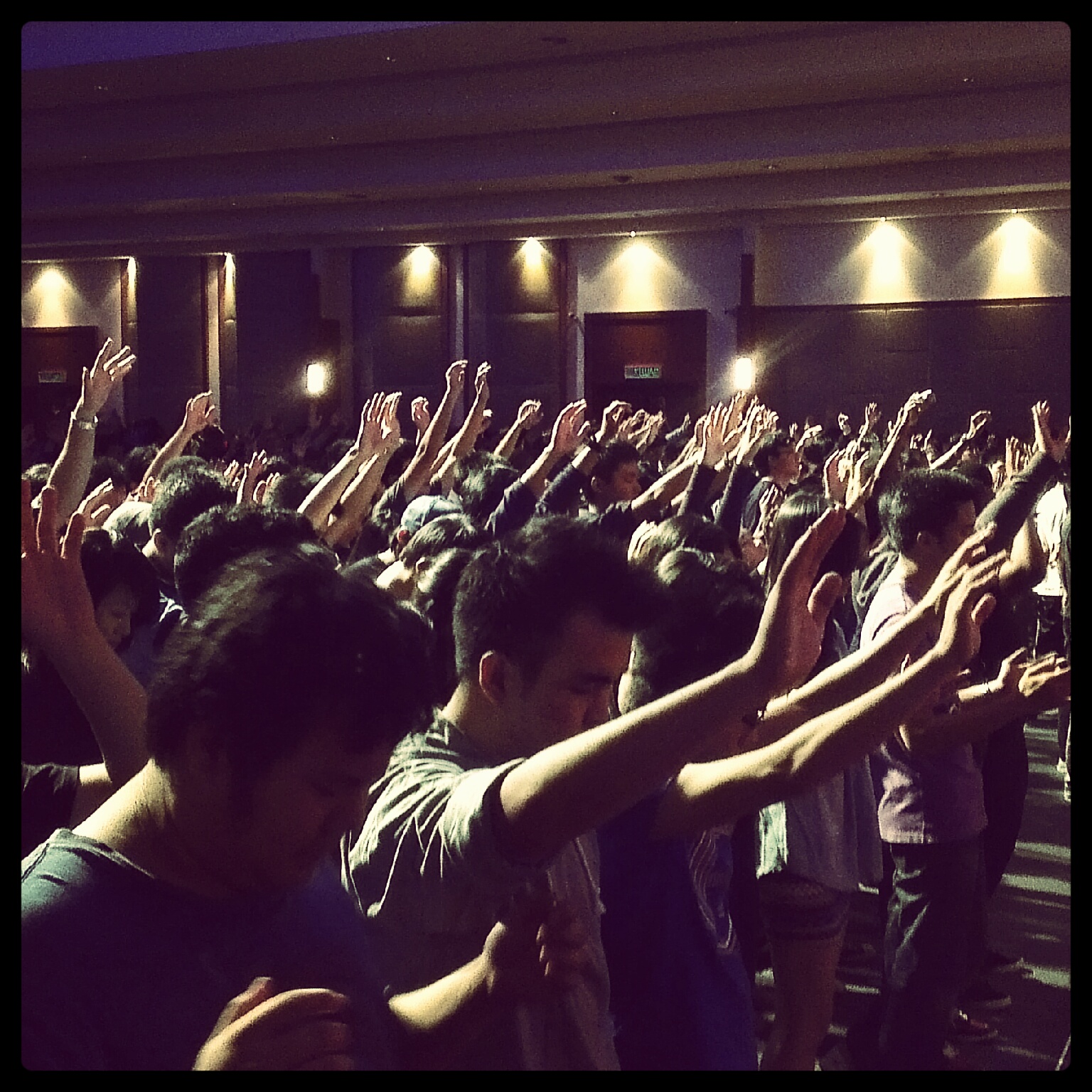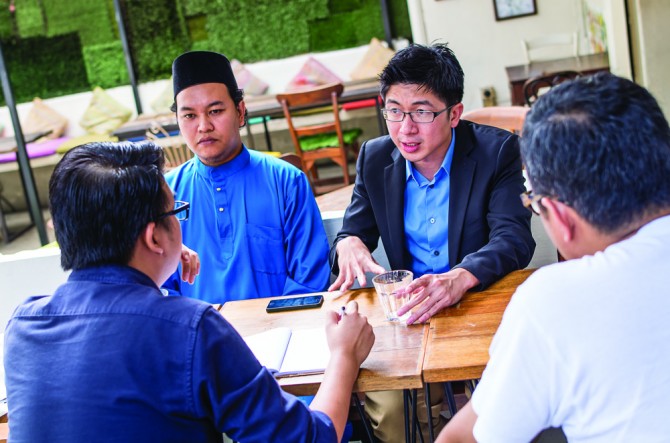Two Malaysians Answer Difficult Questions About Being A Muslim And Christian In Malaysia
We could use more interfaith dialogues like this. Read what Edry Faizal and Peter Toyat have to say about the things that are uniting and dividing Malaysians of all walks of life.
In an effort to promote interfaith dialogue in times of rising racial tension, CLIVE Magazine interviewed two individuals from "oppposing" faiths to pick their brains on the whole "Allah" argument
In light of the recent controversy on the use of the word “Allah” by non-Muslims, once again the country is thrown into turmoil with various groups, representing either faith, claiming rights to its use.
”Every religion teaches goodness unless interpreted wrongly. The most important thing is for all of us to coexist together.” – Edry
Image via cliveworld.comIn a quest to get a better understanding of things, CLIVE speaks to two individuals from different faiths, but pretty much on the same wavelength. Edry Faizal works as a coordinator for www.roketkini.com, the Democratic Action Party’s (DAP) Malay language online portal. He was also previously with the Islamic Renaissance Front – an intellectual movement and think thank focused on youth empowerment and promotion of intellectual Muslim discourse.
“Who are we to impose belief, when belief has to be something uniquely chosen, when you adhere to a truth that you uniquely chose yourself, it is your choice.” -Peter
Image via cliveworld.comJoining him for this interfaith discussion is Peter Toyat, a Catholic Christian actively involved in inter-religious dialogues, a Master’s Degree holder in the study of theology from the Franciscan University of Steubenville, and a chemical engineer by profession.
1. So what’s your personal opinion on the use of “Allah” by non-Muslims?
Edry: This is surely a political agenda rather than a religious issue the word ‘Allah’ has been used before by non-Muslims. Interesting enough, every time we talk about this issue, it always involves Christians and Muslims. Others, such as Sikhs or Hindus, are usually not discussed even though they have been using the word as well. It’s been practiced for a very long time, but why is it that recently it’s become a touchy issue? My only conclusion is that it’s not about the religion. I remember when I was in several Muslim NGOs, we had no problems identifying that Christianity and Islam developed from the same roots. Essentially we believe in the same God, and our religions stem from an Abrahamic belief.
Peter: We Christians are also in shock because the use of this word predates this current issue. It’s even used in other Muslim countries without any problems. Conversion was not our intention. Secondly, in fitting with the guidelines, we stress that the Bahasa Malaysia Bibles are only to be distributed among the Christian community. Even if a good Muslim can’t tell that it’s a Bible and picks it up, what are the chances the individual will flip to the specific verse that uses that word? With that said, any good Muslim who reads it would know it’s a Bible. These Bahasa Malaysia Bibles are used mostly in Sarawak by Christians who only speak in the national language. Also, changing any text in our scripture verse changes a certain aspect of the story being told as well. The thing is these translated Bibles are not adapted from an English-language source, but rather from Hebraic and Greek text. So, any alteration of the scripture could change an interpretation of scripture.
2. Why is it that many Malaysian Malays try too hard to be an exemplary Muslim?
Edry: Probably because Malays here try very hard to identify themselves as Muslims and sometimes leave themselves wide open to outside influence. From what I’ve observed, this present turmoil has always been related to power. You always hear statements like: “Oh, the Christians are using the word Allah. They are trying to confuse Muslims so they will abandon their faith. This way we will get weaker and lose our political power”. This is rather interesting because I believe as some of these angry ‘Muslims’ don’t even pray five times a day, or just as easily move on from this serious topic to discussing about which massage parlours they should visit! And why have Christians become such an easy target? Well, all one needs to do is to pick up a history book and read about The Crusades…
3. Every religion preaches understanding and compassion. So why hasn’t there been any give and take in the quest to find a solution to this misunderstanding?
Edry: Unfortunately we don’t enjoy open dialogues or debates in Malaysia, especially where religion is concerned. I do get that religion is a bit like your privates! You don’t go around showing if off to everyone. But now no one ever talks about it, or try to solve issues together before it becomes a problem. The culture of dialogue is simply not prevalent here. Let’s not even talk about tolerance. In truth we are all pretty much still segregated. This leads us to believe that everything is okay but when the smallest of issues becomes manipulated, problems arise like what we have today. Only now we have people trying to promote dialogue, but the problem is already spreading like wildfire, and we need a lot of effort to control it.
Peter: Problems will come up when one party tries to impose their beliefs with authority onto the other party. This is when things get very complicated. For example, you believe in something, and I believe in something else. But then I tell you that you’re are wrong, and I am convinced that you should believe in my ‘truth’. There is something very wrong about this already, especially when one party is being coerced into doing so. The issue gets even more complicated now because state and religion has becomes mixed with each other.
4. But how is it that people can allow something that’s so close to them like religion be used like a tool?
Peter: Those in rural areas are only exposed to one source of news and to them, what they read and see on TV is the ‘truth’. This just makes them easy to manipulate
Edry: There’s also this fear among the Muslims here when they encounter modernity. They have some problem marrying religion with modernity. Why are Christians always being targeted? Well, its’ simply because there is a history of conflict involving the two religions. For example, just a few weeks ago, the Al-Hijrah Islamic channel on Astro held a forum. And the subject of the discussion was not allowing history to repeat itself, when Christian conquered Muslim lands because we (Muslims) were not united.
5. So why is it that in Malaysia, Islamic religious guidelines need to be backed by the letter of the law?
Edry: To be honest, it doesn’t need to be. This just makes the religion look so weak because it needs a particular law to back it up. Only weak or disabled people need crutches, right? And in this present reality, the law just doesn’t give Muslims crutches, but also equips certain irresponsible ones with parangs and other weapons as well. There is no logical rationale behind needing a law to back up any religion because at the end of the day, religion is all about practising your love to the Almighty… now that shouldn’t be forced or coerced on anybody in any way, yes?
Peter: Laws are written because it dictates through human reasoning about what is good and not. These laws are set to protect the rights and dignity of everyone. But laws that you have may differ from the opinions and ideals of another society, and who has any right to set a standard of perfection? More importantly, who has the right to set a law that is perfect? It’s very difficult, but we Christians at least believe that God is perfect and His law is beyond reproach.
6. The Quran and the Bible are both very old books, and it takes a degree of proper interpretation to get the stories within them straight. But different people have different interpretations…
Edry: In Islam, we don’t have any official bodies charged with interpreting the Quran. The interpretations are all surmised by certain individuals. These interpreters even have varying conclusions to the meanings among themselves. So perhaps one should not look at any one interpretation from an authoritative point-of-view. In history, when the Muslim authorities wanted al-Muwatta, a monumental book by Iman Malik (a famous Muslim scholar and cleric from medieval Medina) to be issued as a law in the country, he refused saying it may excluded other interpretations. From here we can see that from Muslim traditionally, interpretation from the Quran was never part of authority. This has only been a very recent affair.
Peter: Christianity faces similar issues as well, in view of the different denominations of the church. But from a Catholic point-of-view, Vatican II in their document “Dei Verbum” outlines the three aspects that need to be taken into consideration when interpreting the Scripture. The first being the scripture itself in light of the issue at hand. Second, it is by the way of the traditions of the Catholic Church. Finally, we will have a magisterium and overarching body that oversees the interpretation of scripture. This will see if it fits in what is good and what is true. You can interpret scripture, but sometimes people will do it a little off-key. The church acts as a community or body that guides and helps each other to nurture to a certain truth.
For example, one can look at the Bible and say there’s a part of the holy book that says you’re allowed to kill at some time in the past; therefore it probably means that you can kill in the present too. But we, of course, will say no! That notion is wrong because it infringes on present day human rights and with what is true right now in the current situation.
7. Speaking of the current situation, how is it that religion is still relevant in today’s age of science and technology?
Edry: Some people look at religion as a guide to state and physical means, while I look at it as a guide to metaphysical things. This is because that is what religion is all about in the first place. It is a source for morality. Every religion teaches goodness unless interpreted wrongly. The most important thing is for all of us to coexist together, be it the atheist or a religious person, and no matter from which source of morality one draws upon.
Peter: From a Christian perspective, Man is created in the image and likeness of God, with that said, man’s source begins from God and ends with God. A person who wants to be a good Christian follows in what is true and what is good.
Therefore it only makes sense that our life, religion and beliefs are inseparable from ourselves as a human. So what we do, what we breathe, what we live and how we act, it’s all inseparable. Religion is us.
8. Is there a correlation between religious prejudice and racism?
Edry: I think its racial prejudice that promotes religious prejudice. For example, how the current issue came about was when some feared that the use of the word ‘Allah’ by non-Muslims will result in the Malays and Muslims in general, losing their voice and power. Eh, really? Suddenly there’s a named race coming into the picture (Laughs). That’s why we have a problem when a Malay person decides to leave Islam. Even though you can throw various verses about on how there is no coercion in this religion, the simple fact is that a Malay person cannot leave Islam because the constitution says so. But why does the constitution say so? Isn’t it as a means to preserve ‘Malay power’?
9. So you’re in the opinion that a Malay person has the right to leave Islam?
Edry: Yes of course, as it is the right given by the Supreme Being where there is no coercion in the matter of faith. Anyone has the right to choose their faith. At the end of it all, it’s between that person and God. We cannot judge, the only one that can just judge is the most just, most gracious and the most merciful. So yes, I do think that.
10. Well in Malaysia, the fact that a Malay person cannot leave Islam is backed up by the country’s law. Which part of the Quran actually allows for this then?
Edry: In this case, it’s back to the interpretations of issue of Murtad (apostasy). But these interpretations are based on a time when religion and power were very much intertwined with each other. Back then when one leaves his or her religion, it is akin to committing treason. But then again, there were still people who left their religion during that period. Abdullah Ibn Sad Ibn Abi Sarh was a scribe of the Quran back in those days. He left Islam and went back to Mecca. Here he even started a rumour that what’s written in the book was different from what the Prophet Muhammad had said. Yet, this guy was left unharmed when today he would surely be killed for what he did.
11. Moving on then, any thoughts on diffusing the current situation?
Edry: The problem with our community is that we don’t have much trust among each other, no matter what the idea of unity actually preaches. There’s always some sort of trust conflict simmering in the background. Why should we be united then? Well, probably because we don’t want May 13th to happen, again, yes? Instead, why are Muslim told to unite? Well, to avoid another crusade! Another conflict! There is no unification in terms of values, only lately perhaps but these are political values. We need to find good, term value and voices for moderation. But the problem here is that moderates do not voice out their opinions and ideals. They know something is wrong but they don’t voice it out. This is what I’m afraid of as silence and lack of action will lead people to fall into the trap of manipulation.
12. And how do you feel being a Christian living in Malaysia in the present, Peter? And what do you think needs to be done?
Peter: Ever since returning from my studies, I’ve been involved in inter-religious dialogues, coincidentally with the Islamic Renaissance Front. And part of the solution that I see is that we need to first understand each other and have dialogues with an open mind. We all have to learn about each other. Establishing that first round of conversation will open up a lot of things, and also remove blatant labeling like race, religion and others. We have to remove all these labels because we are all one people: Malaysians.
13. And finally, what is your biggest fear for this country?
Edry and Peter: DISUNITY.
Do you agree or disagree with Edry and Peter? Share your thoughts in the Comment section of this story.
This certainly shows that the two are certainly united in their views. The two clearly see that polarisation is already happening at a drastic level here in Malaysia. But we still have time to change things. Should we just wait around and pray for the Almighty to save us from ourselves? So, now the ball is finally in your court and what would you do? Would you choose confrontation, or would you instead sit down and calmly think for a second. Remember that religion, be it Islam or Christianity, has always been about love, tolerance and understanding.
